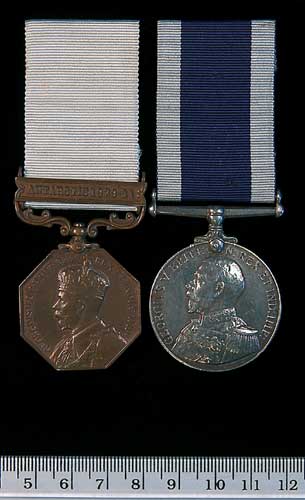
Auction: 5019 - Orders, Decorations, Campaign Medals & Militaria
Lot: 200
A Scarce Polar Expedition Pair to Petty Officer Telegraphist A.J. Williams, Royal Navy Polar Medal, G.V.R., 2nd ´Crowned Head´ type, one clasp, Antarctic 1929-31, bronze (P.O. Telegraphist A.J. Williams., R.N.); Royal Naval Long Service & G.C., G.V.R., 2nd type, with non-swivel suspension (J-13558 A.J. Williams P O Tel. H.M.S. Victory), contact marks to the latter, therefore good very fine or better (2) Estimate £ 1,600-1,750Polar Medal London Gazette 1.5.1934 Petty Officer Telegraphist Arthur J. Williams, Royal Navy, took part in the British Australian New Zealand Antarctic Research Expedition (BANZARE) 1929-31 on board Discovery, to explore the unknown area of Antarctic coastline between Kaiser Wilhelm II Land and Coats Land, a stretch of approximately 2,500 miles. Discovery, under the command of Sir Douglas Mawson, left Capetown 19.10.1929 and travelled south, reaching a latitude of 65° 41´ S 16.12.1939. For the rest of the summer vast tracts of the frozen continent were charted, with the assistance of a seaplane, including a range of mountains which was named after Captain R.F. Scott, RN. Due to a shortage of coal, Discovery left the Antarctic 26.1.1930, reaching Australia to re-fuel 31.3.1930. Discovery left Hobart 22.11.1930 on a second voyage south of the 65th parallel, continuing from where she had left off the previous summer, and charting further lengths of the coastline. Again, a shortage of coal required the ship to return to Australia, leaving the Antarctic 19.2.1931. P.O. Telegraphist Williams was one of 22 officers and men to receive the Polar Medal in Bronze for Antarctic 1929-31; a further 16 officers and men were awarded the medal for the first voyage Antarctic 1929-30, and 18 officers and men were awarded the medal for the second voyage Antarctic 1930-31.
Sold for
£2,800




